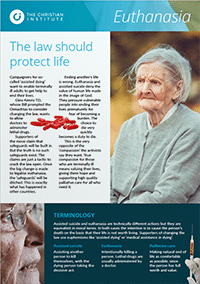The Archbishop of Canterbury has warned that legalising assisted suicide would “cross a moral boundary”, and lead us into “very dangerous territory” during his address to the Church of England’s General Synod.
Dr Rowan Williams also used his address to criticise Harriet Harman’s Equality Bill, currently before Parliament, which he described as “ideological” and “dangerous”.
During his speech Dr Williams declared that the church “will argue fiercely, so long as legal argument continues, that granting a ‘right to die’ is not only a moral mistake, as I believe myself, but the upsetting of a balance of freedoms.”
He also cautioned that legalising assisted suicide would bring “with it a risk to the freedom of others not to be manipulated or harassed or simply demoralised when in a weakened condition.”
He continued: “Once the possibility is there, it will not only be utilised by the smallish number of high-profile hard cases but will also create an ethical framework in which the worthwhileness of some lives is undermined by the legal expression of what feels like public impatience with protracted dying and ‘unproductive’ lives.”
The Archbishop said that the existing law “serves us better”.
The Archbishop’s warning comes ahead of the controversial publication of final guidance from the Director of Public Prosecutions (DPP) on when cases of assisted suicide will be prosecuted.
The DPP’s final guidance for England and Wales will be published this Spring.
The Archbishop also used his address to attack Harriet Harman’s proposed Equality Bill.
He said: “The freedom of government to settle debated moral questions for the diverse communities of civil society is not something we should endorse too rapidly”.
He added: “If we concede the right to government to settle matters for religious bodies in some areas, how do we resist it in others?”
The Archbishop’s comments follow Harriet Harman’s announcement that the Government will not try and overturn amendments to the Bill voted for by the House of Lords.
The Equality Bill could have dramatically narrowed churches’ rights to only employ people whose private conduct was consistent with the Bible’s teachings.
But the House of Lords backed amendments by Baroness O’Cathain which restored the wording of the current law.
The Equality Bill could still however place a duty on public bodies, like schools and the police, to promote homosexual and transsexual ‘rights’.

